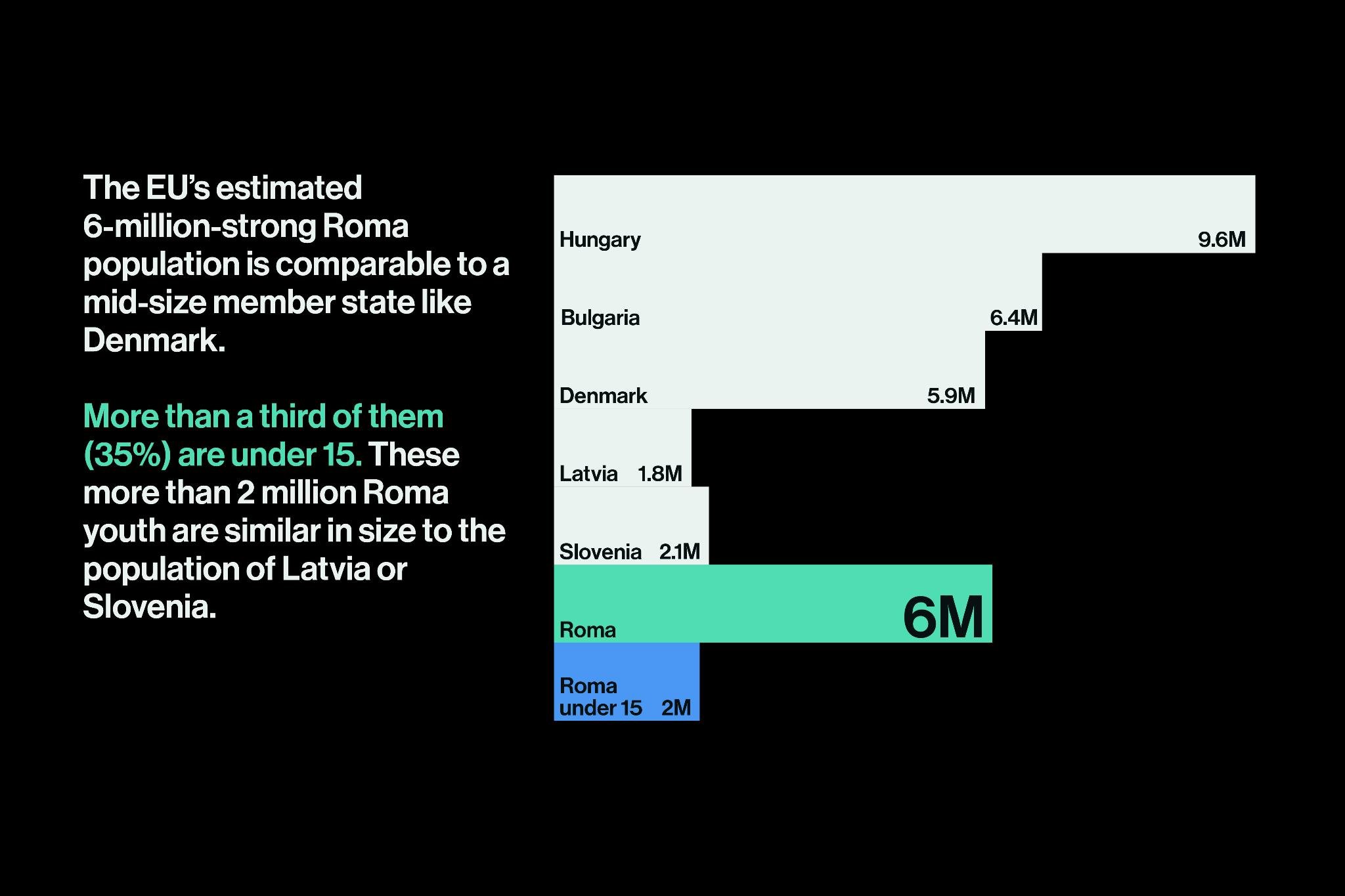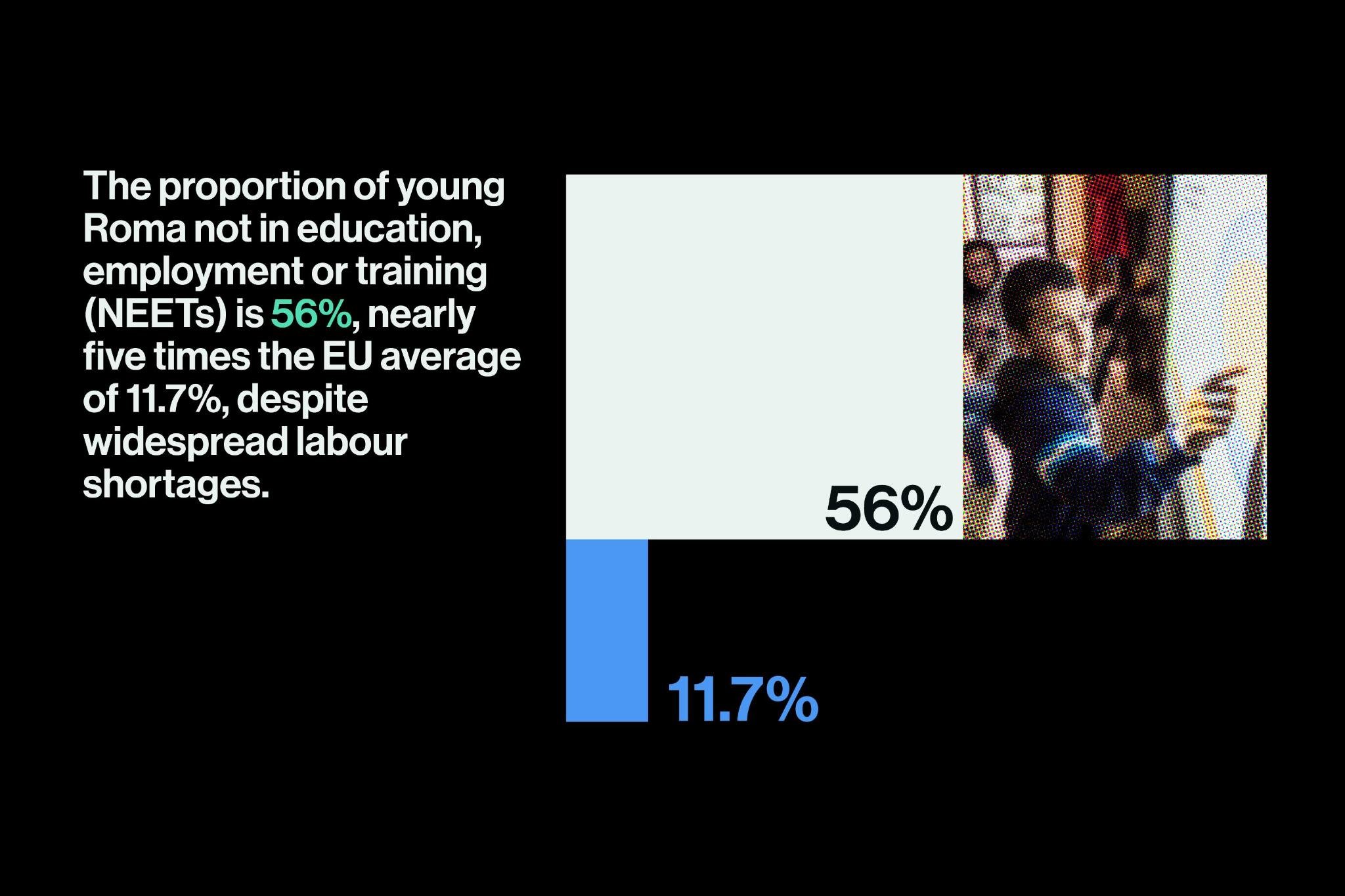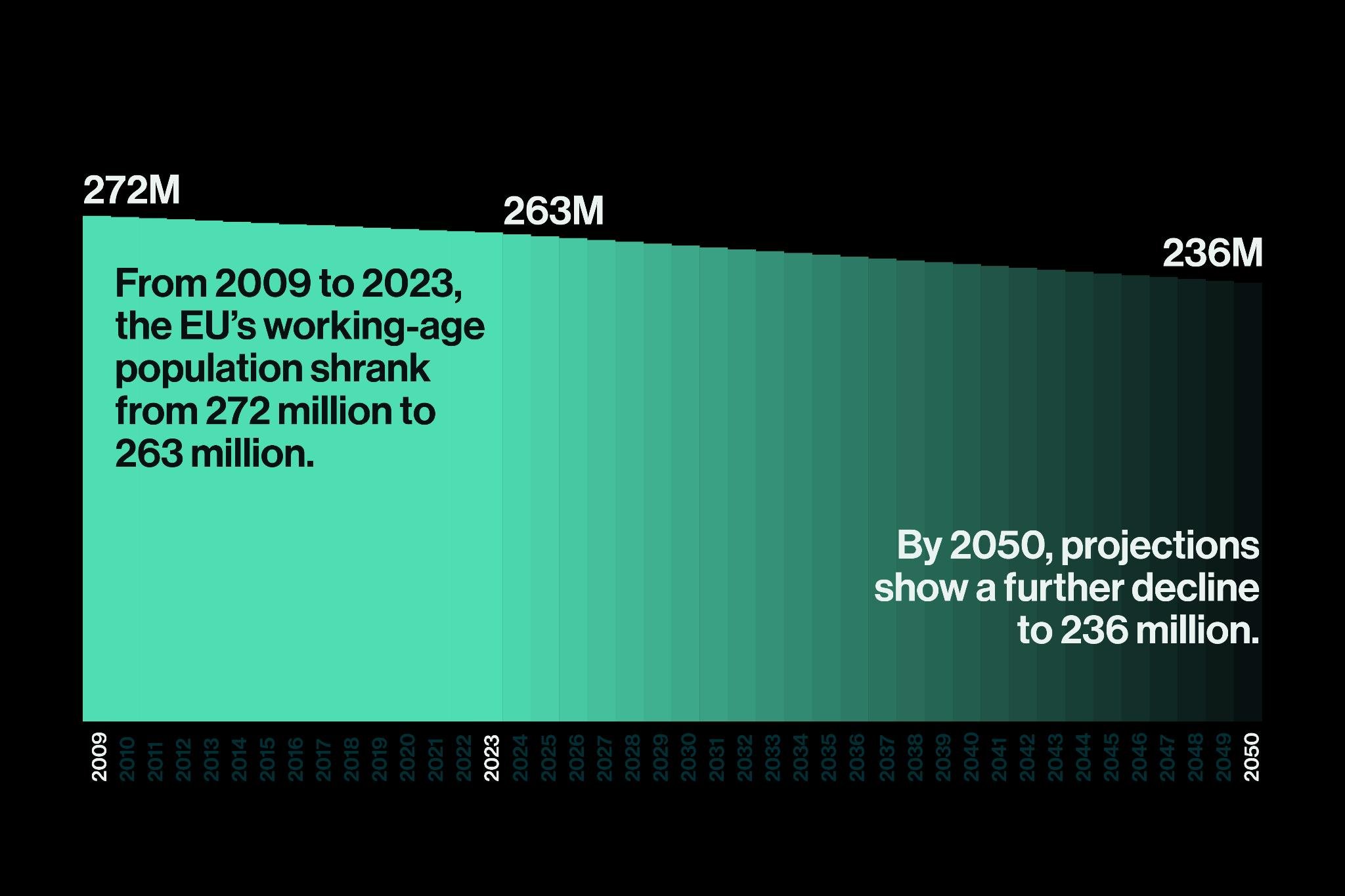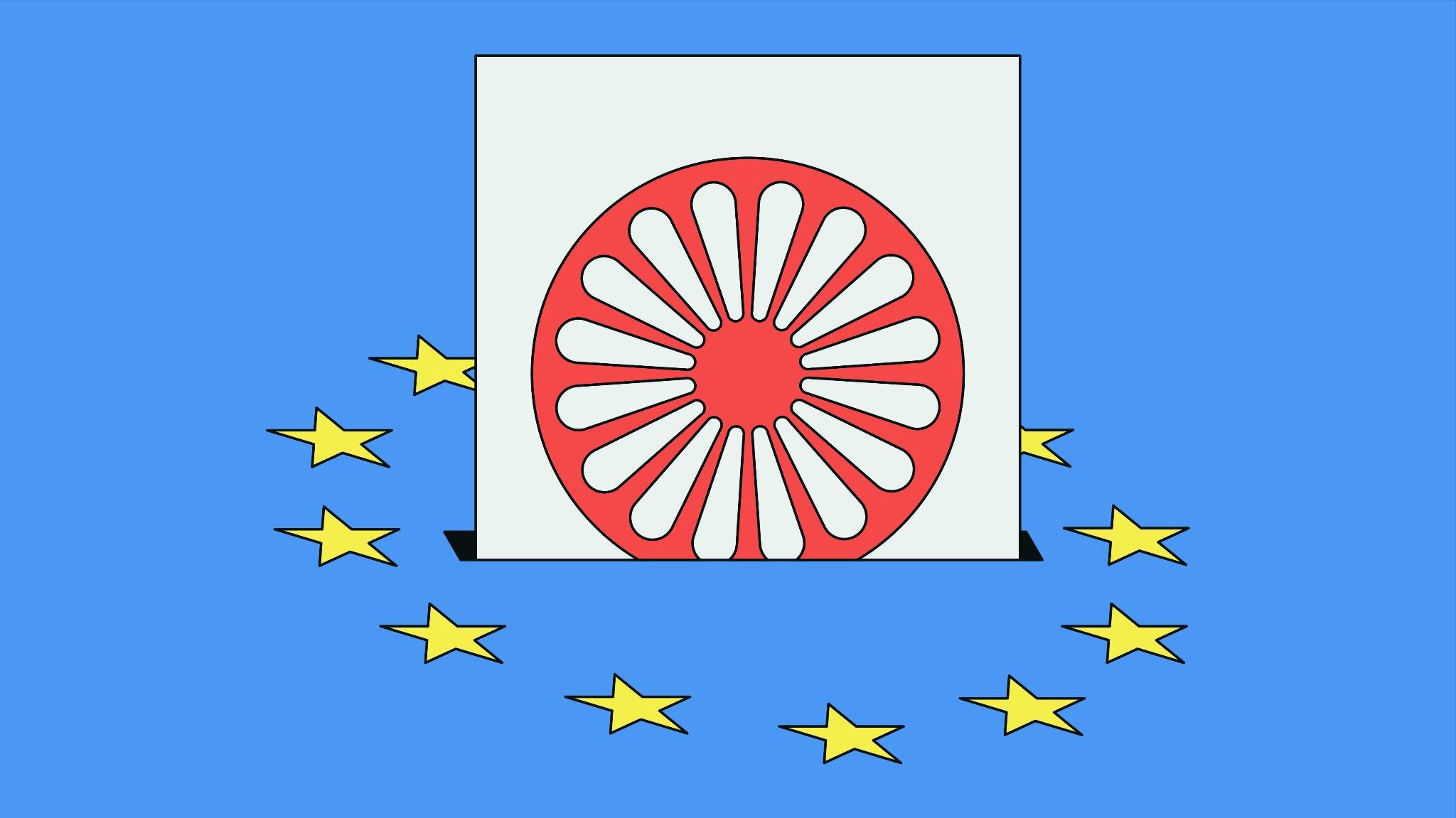Ageing and threatened from both inside and outside, the European Union’s fate is closely intertwined with the Roma, its biggest and most resilient minority.
The EU’s estimated 6-million-strong Roma population is comparable to a mid-size member state like Denmark. More importantly, its Roma are the youngest and most vibrant demographic group; more than a third of them (35%) are under 15. These more than 2 million Roma youth, similar in size to the population of Latvia or Slovenia, represent a distinct opportunity for the EU.
Shortcomings of existing economic policies and the blind spots of democratic systems, compounded by politically weaponised racism, have left Roma at the bottom of their societies. While they are not the only group that has been left behind, living standards for most Roma in Europe are closer to those in the poorest regions of the world.
Despite this, the Roma have been loyal. They have never threatened the security or well-being of their countries. Instead, hoping for better treatment, they have often stood up to defend them.
Given the size and youth of the Roma population in Europe today as well as demographic projections, such a situation is not only detrimental to Roma. Neglect of the Roma weakens Europe’s economic strength, its political stability, its social cohesion, its credibility and its global competitiveness.

Why the EU needs Roma workers and business owners
From 2009 to 2023, the EU's working-age population shrank from 272 million to 263 million, and projections show a further decline to 236 million by 2050. This trend threatens the EU's economic vitality and competitive edge. Yet within its borders lies a solution: the Roma community—a significant yet underutilised demographic. The percentage of Roma youth in EU member states is two to three times higher than among the rest of the population. The Roma are also multilingual, adaptable, entrepreneurial and fast learners, as these qualities have been necessary for finding a way forward amid hostility, racism and poverty.
Although the Roma are a considerable potential workforce, economic policymakers fail to address the systemic disadvantages that Roma face. The proportion of young Roma not in education, employment or training (NEETs) is 56%, nearly five times the EU average of 11.7%, despite widespread labour shortages. With an employment rate of just 43% for Roma aged 20–64 and an even lower rate among Roma women (28%), there are considerable economic and social costs to this neglect.
If empowered and included in the workforce, Roma could significantly help mitigate the effects of a shrinking EU population.
Why the EU needs Roma voters and candidates
The conflict in Ukraine has driven the sense of urgency among EU leaders about defending democracy. Within the EU, however, undemocratic practices such as voter coercion and clientelism erode the integrity of elections. These issues are often downplayed and seen as problems that the EU should address outside its borders through its foreign policy. This underscores a concerning paradox: while the EU staunchly champions democracy beyond its borders, it does not put sufficient effort into defending democracy at home.
This paradox affects groups like women, the rural poor and minorities such as the Roma, who are left exposed to coercion due to the lack of political empowerment, economic dispossession and the risk of poverty. If Europe does not act to change this now, it risks losing generations of potential pro-European voters and candidates. As mentioned above, the proportion of children below the age of 15 among the EU’s Roma is two to three times higher than among the majority population. This means there will also be a higher proportion of Roma among the next generations of citizens eligible to vote and run for office. Roma, for example, will make up around 20 percent of first-time voters in Bulgaria by 2035.
For this reason, Roma should be an obvious constituency for politicians committed to equality, democracy and the rule of law to reach out to, mobilise and deliver public services to. However, the failure of politicians to do so, combined with economic inequality, erodes trust and the belief in democracy among Roma, pushing them to abstain from voting and other political activity or, even worse, pushing them into the hands of anti-European forces. In Bulgaria, the general voter turnout was just 37% for the elections in 2022 and 2023, implying a general lack of interest in the political process. The Roma turnout rate, however, consistently fell below the general voter turnout rate and ranged from 15% to 31%. The same applies to other disadvantaged groups, and defending those most susceptible to anti-democratic manipulation, therefore, is not just a moral obligation; it is an urgent political imperative.
Why the EU needs Roma artists and cultural producers
As the EU's focus on security grows, the purchase of weapons cannot be the only response to Russia’s hybrid warfare, which includes inciting culture wars within EU member states. Culture wars have created extreme polarisation around the values of solidarity, equality and liberty. Extremist politicians weaponise culture with simplistic “us versus them” narratives, and with prejudice against the Roma entrenched across Europe, Roma are an obvious “them” to exploit.
The potential of Roma culture and art, on the other hand, lies in the fact that Roma messages are messages of humanity, coexistence and peace rather than of hate. Roma have never been a group that posed a threat to the security or well-being of their societies; as history shows, Roma have fought for "us". The domain of culture, however, has been perhaps the only area of consistent positive interaction between Roma and non-Roma. Investing in culture is therefore necessary to weaken the opponents of European values; investment in Roma culture should be a response to the culture wars.

Unfortunately, the political mainstream has undervalued the power of culture and cut investment in it. While remaining funding is nominally open to everyone, the funding criteria—for example, having existing infrastructure such as a gallery space—often disqualify Roma artists and cultural producers and others in similar positions. Consequently, the artists, producers and cultural institutions that promote and defend European values increasingly struggle for survival. The means available to them are far too insufficient for competing against those who stand for division and hate, whose continued rise threatens both unity within European societies and the EU’s credibility.
Investment is necessary, possible, and urgent
The EU’s priorities and strategies need to be transformed, and decisive action is needed to eradicate undemocratic practices, defend its values, strengthen its culture – and realise the Roma’s full potential to contribute to its economic growth.
Investment in skills, education and entrepreneurship
If every Roma child today received the necessary education and support to enter the workforce by 2035 with the skills required to earn the EU's average income, the result could be a €600 billion boost to the EU's economy—a sum comparable to the total revenues of Volkswagen, the Mercedes-Benz Group and BMW combined. Investing in the Roma generates public good and revenues that can benefit everyone.
The European Commission has identified 42 occupations facing EU-wide shortages, and labour shortages in both high-skilled and low-skilled occupations will continue. Targeted education and training for underrepresented groups like the Roma could bolster sectors struggling with labour deficits. Digital technologies will create new opportunities, and by 2030 the renewable energy sector alone will create 3.5 million new jobs. This highlights the necessity of upskilling and including all communities in the workforce. The European Commission's recent action plan to tackle labour and skill shortages is a step in the right direction, with €65 billion in EU funds available to invest in skills. However, implementation depends on member states and social partners, which have proved rigid and ineffective in supporting Roma.
The following actions are essential for realising the full potential of the Roma to contribute to the EU’s economic growth:
- Reform procurement by introducing tax incentives and subsidies for contractors employing groups that have suffered long-term poverty and unemployment, including Roma women and youth, and reduce taxation for low earners.
- Provide long-term, stable and innovative education support programmes for young children among the Roma, the rural poor and other disadvantaged communities.
- Set up on-the-job training and centres of vocational excellence in Roma neighbourhoods.
- Facilitate Roma entrepreneurs' access to capital, which is not only about finance but also support services like training, mentoring, networking, and business incubators and accelerators. The existing financial schemes in the EU need to be blended, as they are too segmented and do not reinforce each other.

Investment in safeguarding democracy
Practical mechanisms aimed at safeguarding democracies must be prioritised. The Citizens, Equality, Rights and Values (CERV) programme, initiated in 2021 with a budget of €1.55 billion, does provide funding to protect and promote European rights and values. While this is a promising initiative, however, it does not prioritise the defence of electoral integrity. It should do so, particularly in regions grappling with internal threats.
The following actions are strategic priorities for eradicating undemocratic practices:
- Engage citizens in long- and short-term non-partisan electoral observation projects. Mobilise those most affected by voter coercion and manipulation to help safeguard the integrity of electoral processes.
- Continue efforts to combat online disinformation. There is a crucial need to expand voter information and education campaigns, particularly in the digital sphere, tailored to those most vulnerable to voter manipulation.
- Establish regular and intensive exchanges among governing officials, political parties and the most excluded voters. Fund initiatives that engage the most affected segments of the population, ensuring that their voices are heard and their needs are addressed beyond the electoral cycle.
Investment in unity and defence against culture wars
To defend the values upon which the EU is built, the European Commission must transform its priorities and strategies for investment in culture, especially for those under attack by far-right culture wars. In the case of the Roma, the most positive discourse is about their contribution to European societies in the domain of arts and culture. Investment in initiatives to amplify this has significant potential for helping build unity and resistance to the “us versus them” politics of extreme polarisation.
The following actions are required for such a transformation:
- Increase investment in culture and directly manage cultural funding from Brussels, rather than from national capitals, to counterbalance the misuse of European funding in support of nationalistic and antidemocratic narratives.
- Seek, inspire and support ideas that generate tangible, long-term results in cultural infrastructure and the recognition of the Roma as an integral part of European societies.
- Reassess eligibility criteria and introduce conditionality criteria in cultural funding to support translocal cultural projects, especially at the peripheries that are vulnerable to the weaponisation of prejudice and fearmongering.
- Build on the potential of cultural entrepreneurship, especially among vulnerable communities, by investing in the expansion of the cultural industry and helping Roma cultural producers move out of informal employment.
- Introduce programs that support experimentation and innovation at the peripheries—where the change in culture often happens—to reimagine the role of cultural institutions, expand access to culture for the masses, and embrace new forms for the artistic expression of European values and solidarity.
Europe faces enormous challenges that require a collective effort, long-term vision and political will that lasts beyond the next election. If the EU is determined to defend democracy, it should create conditions that enable the Roma and all citizens to live to their full potential—and contribute to the future success of the European project.
The Roma for Europe 2030 agenda is a collaboration of the European Roma Institute for Arts and Culture, the Roma Education Fund, the Roma Entrepreneurship Development Initiative, Roma for Democracy and the Roma Foundation for Europe.

Roma Foundation for Europe
The latest

Serbia Must Amend Missing Persons Alert System to Protect Vulnerable Adults

Constitutional Review of the Šutar Law Confirms Serious Rule-of-Law Concerns

Europe’s Growth Depends on Roma Talent
Browse by category
Campaigns
Events
Facts
Press
Voices
For media inquiries:
[email protected]Sign up here so you don’t miss out on campaign updates, upcoming events and other news from the Roma Foundation for Europe and our network.
Sign up for our newsletter